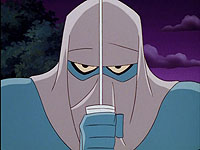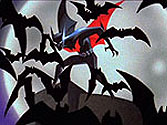|
 A
contest for three professionals (Wayne, Gordon and Curare) and an amateur
(McGinnis), with the life of Gotham's D.A. hanging as prize for the winner.
Pride, hurt feelings, and more than a little of the old competitive spirit
make this episode, from an analytical perspective, one of the more interesting
attempted. A
contest for three professionals (Wayne, Gordon and Curare) and an amateur
(McGinnis), with the life of Gotham's D.A. hanging as prize for the winner.
Pride, hurt feelings, and more than a little of the old competitive spirit
make this episode, from an analytical perspective, one of the more interesting
attempted.
Gordon gave up being
Batgirl to join the police force and eventually became commissioner of
police—a fairly decisive endorsement of the uniform over the cape.
Her relationship with Wayne did not end happily (apparently they were
having an affair), so there seems both a personal and a professional edge
to her repeated insistence that Batman butt out of the present case. Busybody
that he is, Wayne can't resist the implicit challenge, to prove himself
still necessary and still superior to the Gordons. That the target to
be protected is also Gordon's husband makes the criss-crossing undercurrents
of motivation all the more vexed.
Slicing neatly through
this intriguing Gordion knot is Curare's finely honed scimitar. Her actions
are the motor that drive the plot, and her repeated attempts on Sam keep
the episode from degenerating into a therapy session. Still, her presence
doesn't cast any light on the drama; she is a MacGuffin from the tip of
her sword to the tip of her toes, and is given no personality, no development,
and virtually no background. (This is not a complaint, I hasten to add.
In the present context any of these would be a sore distraction; and even
by itself, the conception of such a villainous blank is fiendishly audacious.)
The problem is point-of-view. Since Curare has no character, there is
little to be gained from watching her in action, and much that is lost
from not watching Barbara and Bruce. The story should have focused, not
on the actual fights, but on their preparations and reactions: on the
traps they lay for Curare, and the traps they lay for each other.
Fundamentally, this
is not a story about a competition between McGinnis and Curare, or Gordon
and Curare, but about the competition between Gordon and Wayne. They are
like big-game hunters awaiting the approach of the man-eating cat, afraid
both that the stalker will win by catching the prey, and that the competition
will win by catching the stalker. That the story survives the misplacing
of its attentions is testament to Riba's continuing skill with a fight
scene, and to Bader's continuing skill with ambiguous female characters.
|

 A
Touch of Curare
A
Touch of Curare